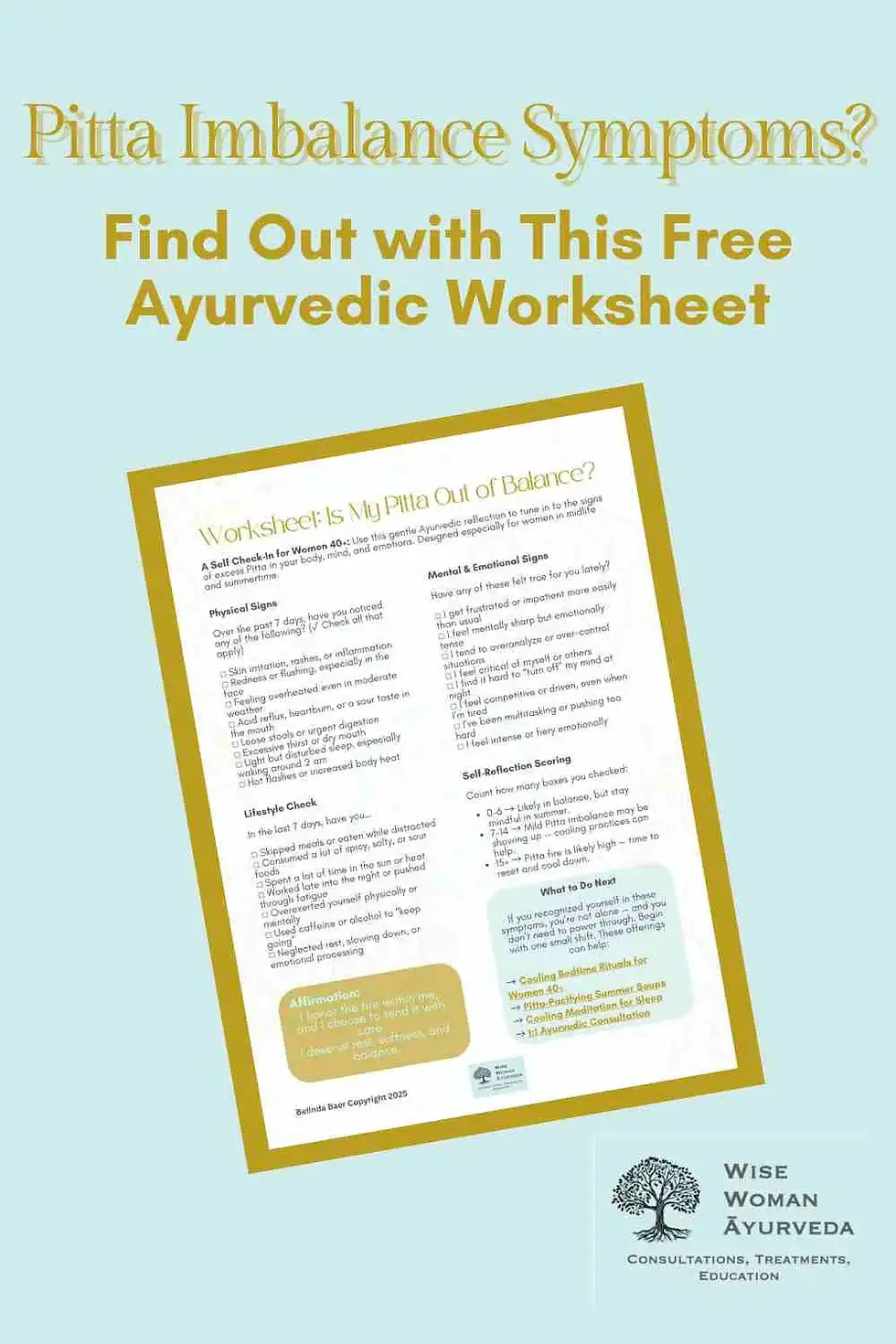5 Ways to Stay Cool in the Summer Naturally with Ayurveda
- Belinda Baer. Ayurvedic Practitioner at Wise Woman Ayurveda

- Apr 27, 2024
- 11 min read
Updated: Aug 29, 2025

Summer brings long days, golden light, and abundant energy.
Yet, for many women—especially after 40—it can also bring discomfort.
Hot flashes, restless nights, irritability, and digestive flare-ups often feel sharper in summer’s heat.
Ayurveda, the ancient science of life, explains this beautifully.
Summer is ruled by Pitta dosha, the energy of fire and water.
When Pitta becomes aggravated, the body and mind can feel overheated—both literally and emotionally.
The good news?
Ayurvedic cooling tips are gentle, practical tools to restore balance.
In this post, I’ll share 5 ways to stay cool in the summer using Ayurveda.
These tips go beyond “drink water and stay in the shade”—they help you find summer heat relief for body, mind, and spirit.
Why Staying Cool in Summer Matters for Your Health
When the mercury rises, your body works harder to maintain balance.
Summer heat can dry out the skin, weaken digestion, and disrupt sleep.
Many women notice increased irritability, headaches, or skin flare-ups during hot months (EasyAyurveda).
From an Ayurvedic perspective, this is the impact of excess Pitta dosha—too much heat in the system.
That’s why summer heat relief is more than comfort; it’s a foundation for long-term health.
Keep reading to explore the 5 ways to stay cool in the summer.
Learn more about the Symptoms of Pitta Out of Balance in this post.
Understanding Pitta Dosha in Summer
In Ayurveda, Pitta is composed of fire and water.
It governs digestion, metabolism, and transformation.
In balance, Pitta gives us sharp intelligence, radiant skin, and strong digestion.
But when Pitta is aggravated—common in the hot summer season—it manifests as:
Irritability and frustration
Overheating, hot flashes, or flushed skin
Restless or disturbed sleep
Loose digestion or acid reflux
For women 40+, hormonal changes can magnify these symptoms, making summer especially challenging.
This is why learning to balance Pitta in summer is essential.
Check out this free downloadable worksheet:
5 Ways to Stay Cool in the Summer with Ayurveda
Now let’s explore five deeply nourishing, practical Ayurvedic tips for summer.
These practices are simple yet profound, drawn from the wisdom of Ayurveda and enriched with personal experience.
1. Choose Cooling Foods for Summer
Food is one of Ayurveda’s most powerful medicines and one of the 5 ways to stay cool in the summer discussed in this post.
In summer, the guiding principle is to favor cooling foods for summer—those that pacify Pitta.
If you are feeling overheated, enjoy some of the following cooling foods:
sweet fruits like sweet apples, sweet pears, watermelons, sweet grapes, melons,
green veggies, including green beans, leafy greens, broccoli, artichokes, Brussels sprouts, and asparagus
cooling herbal teas such as rose, lavender, hibiscus, peppermint, fennel, and coriander
other cooling beverages like coconut water, cow's milk, goat's milk
ghee or coconut oil for cooking
Avoid overly spicy, sour, and salty foods during the summer as these can increase the internal heat in the body.
Here are some foods to avoid:
coffee and black tea
chili peppers and other heating spices in excess, like black pepper, mustard seeds, ginger, asafoetida (hing), ajwain
chocolate
nuts, unless they are soaked overnight
sour fruits like sour apples, sour citrus fruit, sour mango, and banana
overly salty foods like snacks, chips, and processed foods, or even using excess salt in cooking
onion, garlic, tomato
To clarify, "avoid" does not suggest that you can never consume these foods, but rather consume them in smaller quantities and less often.
Save the pitta aggravating, heating foods for the late fall, winter, and early spring months.
I remember one particularly hot July afternoon when I craved ice cream but instead reached for fresh watermelon.
The relief was immediate—not only physical but emotional, too.
The sweet taste carries a soothing, grounding energy that nourishes both body and spirit.
Learn more about the 3 Tastes That Pacify Pitta Dosha in this post.
2. Spend Time in or Near Water
Pitta dosha is soothed by being in or near cool water.
Ayurvedic cooling tips include being in water or even just beside water.
If the body of water is in direct sun, either swim in the morning before the excess heat begins, or swim after 2 pm when the sun's intensity is reduced
The moderate exercise of swimming laps is soothing for the pitta mind and body, and sometimes, just floating in the water can help settle pitta dosha and create coolness.
Dunking the head under cool water can help to soothe headaches and excess heat in the head.
Even sitting near water can help to cool you down.
Try sitting near a lake or a babbling brook out in the woods.
3. Practice Cooling Breathwork
Breath is one of Ayurveda’s most direct ways to balance heat and one of the 5 ways to stay cool in the summer discussed in this post.
The Hatha Yoga Pradipika (Muktibodhananda & Saraswati, 1998) describes cooling pranayamas like Sheetali and Seetkari.
Hissing Breath: Seetkari Pranayama

Often known as the "hissing breath," this breathing technique helps to cool the body (Swatmarama, 243).
Benefits of the Hissing Breath (Swatmarama, 243-248):
cools the body
cools the tongue and reduces the blood temperature as it leaves the lungs
heat in the reproductive and excretory organs is reduced
regulates hormonal secretions
balances the endocrine system
makes one virile and attractive
gives control of the mechanisms of the body
stabilizes the mind
deepens the mind/body connection
discourages a lack of motivation
reduces the need for eating, drinking, and sleeping
increases sattva (goodness and purity of the mind--leads to enlightenment)
Contraindications:
chronic constipation (Swatmarama, 244)
extreme cold (Kripalu, 3.28)
excess vata dosha or kapha dosha (Kripalu, 3.28)
How to do the Hissing Breath (Swatmarama, 243-244)
Sit in a comfortable position with the spine elongated
Close the eyes, or look at a spot 2-3 feet in front of you
Hands can be on the knees, using a mudra, if you know one
With the lower and upper teeth pressed together, separate the lips
Slowly breathe in through the gaps in the teeth
Observe the sound of the breath
When the inhalation is finished, close the lips and exhale through the nose
Start with 8 rounds and work your way up to twenty rounds
The Cooling Breath: Sheetali Pranayama
Sheetali has multiple meanings in Sanskrit, it means "cooling" and also "calm," "unemotional," and "without passion. (Swatmarama, 249)"
The Cooling Breath not only cools the body but also the mind (Swatmarama, 249), and can be used after heating breathing practices or anytime during the day (Swatmarama, 250).
Benefits of the Cooling Breath (Swatmarama, 249-251)
lessens an enlarged stomach or spleen
reduces fever
regulates bile
decreases hunger and thirst
counteracts poisons
cools the mind
cools the body
purifies blood
improves digestion
alleviates high blood pressure
soothes the nervous system
Contraindications:
in excessive cold (Swatmarama, 251)
high vata dosha or kapha dosha (Kripalu, 3.28)
How to do the Cooling Breath
Sit in a comfortable position with the spine elongated
Close the eyes, or look at a spot 2-3 feet in front of you
Hands can be on the knees, using a mudra, if you know one
Stick out the tongue
Roll up the sides of the tongue so it forms a tube
Slowly breathe in through the tongue as if you were sucking through a straw
After the inhalation is finished, breathe out through the nose
Start with 9 rounds and work up to 10 minutes
If you can't roll your tongue, stick with the Seetkari breath above.
Just a few minutes of cooling breathwork can calm irritability and restore clarity.
I still recall practicing Sitkari on a rooftop in Kathmandu as the city shimmered in intense heat.
My body softened, my mind steadied.
Explore more about Yoga poses and breathing practices that soothe Pitta dosha in this post.
Download this free, easy reference guide, Breathe to Cool, that you can keep by your bedside.
4. Use Cooling, Soothing Essential Oils
Some of my favorite summertime essential oils include:
rose
sandalwood
lavender
peppermint
jatamansi
Remember that most essential oils should be diluted in a carrier oil (such as coconut or sesame oil) before being applied to the skin. Essential oils are intense and can burn the skin and mucous membranes if not diluted.
This blog deals with the external use of essential oils. Please do not ingest essential oils.
Rose

Rose essential oil keeps the heart open and allows a connection to all things, with a sense of being secure and spiritually attuned. (Miller & Miller, 285).
Pure rose essential oil is expensive, but some lovely diluted rose essential oils are available. Anima Mundi sells my current favorite: Rose Otto.
I apply a drop of Rose Otto to my heart because it is nourishing and heart-opening.
When I'm suffering from the heat in the summer, I'll add a few drops of rose essential oil and 2 cups of milk to my lukewarm bath.
Rose is a natural refrigerant and cools the body down immediately.
Benefits of Rose essential oil include (Miller & Miller, 285-286):
reduces anger and frustration
improves liver function
eases menopause symptoms
reduces pitta-type inflammation
alleviates skin allergies of a pitta nature
can be used in cases of:
amenorrhea
dysmenorrhea
dizziness
mental illness
headache
depression
sore throat
aged skin
impotence
grief
nervousness
acne
Sandalwood
Sandalwood oil is cooling as it keeps you grounded and helps reduce fear (Miller & Miller, 290).
Sandalwood oil is used for spiritual practices as well.
Apply a dab of sandalwood oil to the third eye point, the point above and between the eyebrows, before meditating to aid in focus and concentration during your practice.
Benefits of sandalwood essential oil include (Miller & Miller, 290):
antibacterial
helps reprogram the brain
builds the endocrine (hormonal) system
eases venereal diseases
regulates the uterus
reduces nervousness and anxiety
eases bronchitis
diminishes palpitations
alleviates insomnia
helps with sunstroke
soothes dry skin
lessens nausea
clears acne
ameliorates depression
alleviates impotence
Lavender

Lavender essential oil is an all-around excellent essential oil because it has many medicinal uses (Miller & Miller, 263) beyond cooling.
I carry lavender oil when I travel to use it in case of burns, bug bites, skin irritations, and sunburn.
Uses for lavender essential oil include (Miller & Miller, 263-264):
anxiety and stress
depression
anger and irritability
reducing hypertension
lowering fever
burns
insect bites
wounds
eczema and other skin issues
rheumatism
nerve issues
headaches (rub on temples)
fungal infections (athlete's foot, vaginitis)
motion sickness
insomnia
mood swings
dry skin
water retention
dandruff
hair loss
flu, colds, and bronchitis
Peppermint

Peppermint is excellent for easing pitta dosha and cooling the body and mind (Miller & Miller, 282).
Uses for peppermint essential oil (Miller & Miller, 282):
headaches, especially heat-related (rub diluted oil on temples)
stimulant for depression or lethargy
revitalization (use this when your energy is flagging)
antiseptic
expectoration of mucus (inhalation in steam)
cools the body (mix in milk and add to bath water)
digestive upset
fever, colds, sore throat, and laryngitis
nervous agitation
dysmenorrhea
asthma
I carry peppermint oil when I travel to help clear my sinuses in polluted areas. I'll add some to a bowl of boiled water, cover my head with a towel, and inhale the steam.
Remember that peppermint oil is quite intense, avoid using it directly on the skin.
Jatamansi
Jatamansi (sometimes spelled jatamamsi) is one of my favorite essential oils. It is beneficial for reducing aggravated vata and pitta doshas in the mind.
Jatamansi (or Indian Spikenard) is an endangered plant. Look for sources that are cultivating it and harvesting it sustainably.
I apply jatamansi to the soles of my feet to help cool my mind and body.
Uses for Jatamansi essential oil (Pole, 200):
nervousness
Parkinson's disease
insomnia
cools an exhausted and hot nervous system
clears pitta
increased intellect
mental clarity
headaches
hypertension
flatulence
bloating
peristalsis
nervous skin disorders, including burning and itching sensations
brain rejuvenation
5. Avoid the Hottest Part of the Day
From 10 am to 2 pm, pitta dosha is predominant in the external environment making this the hottest time of day.
Avoid going outside in the hot sun during this time.
Soak your feet in a tub of cool water with one of the essential oils listed above during this time of day to help get relief from the heat.
Dunk the entire body in a lake, river, ocean, or pool away from the direct sun, if possible.
Sip soothing, cooling herbal teas or coconut water between 10 am to 2 pm during the summer.
Learn more about cooling Pitta dosha with this free downloadable Cooling Bedtime Rituals Worksheet.
Align Lifestyle with Ayurveda Summer Tips
Finally, align your whole lifestyle with Ayurveda summer tips:
Wake early, before the sun’s intensity rises.
Take gentle walks in the cool morning or evening.
Avoid strenuous midday activity.
Practice Abhyanga (self-massage) with coconut or Brahmi oil for cooling nourishment.
Abhyanga is one of my favorite practices to recommend.
I massage my feet with coconut oil or ghee before bed—cooling the body, calming the mind, and soothing restless energy.
Beyond the Basics: Cultivating a Cooling Mindset
Ayurveda reminds us that true balance is not only physical—it’s mental and emotional, too.
Summer heat often stirs impatience, irritability, or the urge to “do more.”
Cultivating a mind-body cooling practice might mean:
Journaling in the evening light
Practicing gentle restorative yoga
Choosing patience and surrender over pushing
One summer evening, I sat watching the sun set behind oak trees, restless from the day’s heat.
As the sky shifted to dusky pink, I felt a reminder: summer is not only about intensity—it’s about softening into rhythm.
This is the deeper teaching of Ayurveda.
Integrating Ayurveda into Your Summer Life
The beauty of Ayurveda is that it doesn’t demand perfection.
It asks only for awareness.
By weaving in even one of these Ayurvedic tips for summer, you’ll notice shifts—in digestion, sleep, and emotional balance.
Try this: choose one cooling food, one herbal infusion, or one breath practice to explore this week.
Notice how your body and spirit respond.
FAQs: 5 Ways to Stay Cool in the Summer
Q: What are the best 5 ways to stay cool in the summer according to Ayurveda?
A: Ayurveda recommends five powerful practices: eating cooling foods for summer, staying near water, practicing cooling breathwork, using soothing essential oils, and avoiding the hottest part of the day. These rituals calm excess Pitta dosha and bring lasting summer heat relief for both body and mind.
Q: How does Ayurveda explain why summer heat feels overwhelming after 40?
A: Women over 40 often experience more intense heat because hormonal changes naturally increase Pitta imbalance in summer. Ayurveda shows that by making small lifestyle shifts—like Abhyanga with cooling oils—you can ease hot flashes, irritability, and restless sleep.
Q: Which foods are best for balancing Pitta in summer?
A: Ayurveda encourages enjoying sweet, juicy fruits, leafy greens, coconut, and cooling herbal teas during hot months. These cooling foods for summer counteract heat while avoiding spicy, salty, or sour foods keeps Pitta from flaring up.
Q: Can breathwork really help with summer heat relief?
A: Yes—cooling breathwork practices like Śītalī and Sitkarī pranayama calm irritability, reduce body temperature, and soothe the nervous system. Just a few minutes daily can help you feel refreshed and balanced even in peak summer.
Q: What are natural ways to stay cool in summer beyond food and breathwork?
A: Ayurveda suggests natural ways to stay cool such as avoiding midday sun, using rose or sandalwood essential oil, journaling in the evening, and walking in the cool morning air. These simple practices nourish body, mind, and spirit while bringing steady balance through the season.
Gentle Next Steps
Summer doesn’t need to feel overwhelming.
Small changes, like these 5 ways to stay cool in the summer create ripple effects in health and well-being.
If you’d like to go deeper, I invite you to book a consultation with me.
Together, we can create a personalized summer plan that brings balance, beauty, and ease.
🌿 Explore related posts:
References
Muktibodhananda, Swami, and Swami Satyananda Saraswati. Hatha Yoga Pradipika: Light on Hatha Yoga. 3rd ed., Yoga Publications Trust, 1998.
Kripalu Center. Foundations of Āyurveda. 2019. PDF.
Miller, Dr. Light ND, and Dr. Bryan Miller DC. Ayurveda and Aromatherapy: The Earth Essential Guide to Ancient Wisdom and Modern Healing. 1st ed., Lotus Press, 1995.
.webp)
















Comments